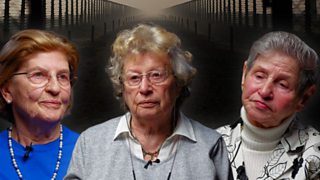The Holocaust: How can we tell this story to young people?
Olga Ivshina
Βι¶ΉΤΌΕΔ News Russian journalist

Left to right: Eva Szepezi, Tamar Dreifuss and Maria Neyman
A recent in Europe suggested that about a third of the 7,000 respondents across seven European countries knew “just a little or nothing at all” about the Holocaust. A revealed that 66% of the US millennials “were unable to identify Auschwitz”. It demonstrated that ignorance of, and indifference to, the Holocaust is growing.
“There is only one thing which is worse than Auschwitz itself. It is forgetting what Auschwitz was,” Eva Szepezi tells me. Both her parents, her brother and most of the relatives perished in concentration camps during World War II. She was lucky to survive. “All those killed by the Nazis have been deprived of their voices, so we must tell the story for them,” Eva says.
Eva escaped death by miracle. Several miracles in fact, as she escaped it a couple of times. As did the other Holocaust survivors we filmed for our documentary.
The 12-year-old Eva managed to escape the gas chamber on her very first day in Auschwitz. Then someone advised her to pretend she was 16 - that way she would be sent to work rather than being gassed as most children in the camp.
Eva’s story is extraordinary and although the events she describes took place over 75 years ago, it’s also a story a young person today can relate to. Where can we find hope in our darkest days? How to overcome the unbearable? How to reach the seemingly unachievable? How to know who is worth your trust and who is not? How to start again when you have lost everything? Is there true love?
The Holocaust survivors in our documentary - Eva Szepezi who was born in Hungary, Maria Neyman from Belarus, and Tamar Dreifuss from Lithuania - explain how, as young girls, they tried to find answers to these questions in the most extreme circumstances while they were struggling to survive the atrocities committed matter-of-factly around them during the war. They also tell us about their other struggle that lasted for decades if not for the rest of their lives. The struggle with themselves, their memories of what had happened, and their struggle for normality and, hopefully, happiness.
There was no neat and easy way to achieve this. Eva Szipezi tells me that to this very day she misses the love of her mother whom she last saw when she was 10. After the war, Eva rushed to build her own family and have a child. “Since I had lost my parents, I desperately wanted to have someone of my own. But that turned out to be not easy. I didn’t have my mom’s example in front of me nearly enough, so sometimes I was just puzzled how I should behave,” she explains.
Eva’s daughter Judith tells me that at 87, her mum is a bit of a child these days. “Her childhood was stolen by the Nazis.” she says. “She was forced to grow up in a moment. And now, when she is old, I feel she sort of tries to enjoy all the joys of the life she missed because of the war.”
I have reported from war zones myself and know first-hand how hard it can be to return to a peaceful life after seeing - and then reporting - war, destruction and suffering. But I can’t even begin to imagine how hard it was for Eva to recover from her war. That was my main focus in her story and the stories of Maria and Tamar.
We tried to help our heroines to tell their harrowing experiences of harrowing times in a way that would also help us better understand ourselves, our strengths and also the world around us. So that when they say, the Holocaust, we identify it with their stories. How a starving Eva scalded her lips as she rushed to get her helping of boiling hot “soup” at the end of her first day of camp work. Or how a terrified Maria Neyman, hiding with her sister in the cellar, heard her mother and two siblings being taken away to be shot. Or how Tamar Dreifuss and her mother hid for days in a kennel with a ferocious dog whom her mother befriended and who didn’t touch its food before the mother and daughter had their share first. Their stories are heart-breaking accounts of unthinkable brutality and suffering, of kindness, and courage, and selflessness. And living with all that for the rest of your life and never giving up, so that it never happens again.
The Βι¶ΉΤΌΕΔ News Russian documentary, Holocaust: The Last Witnesses,
